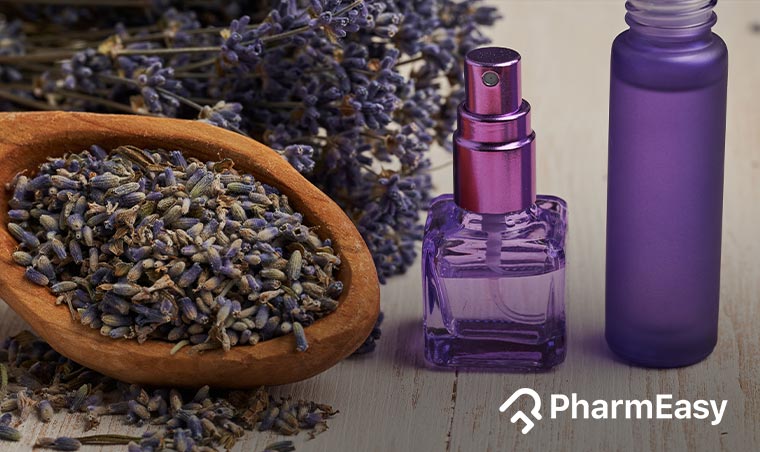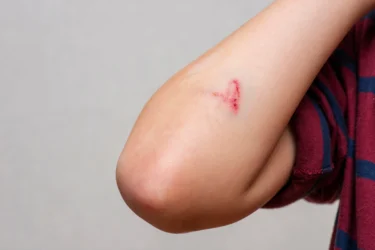Lavender: Uses, Benefits, Side Effects, Precautions & More!
By Dr Ashok Pal +2 more

Get,

to manage your symptom
Get your,


4 Cr+ families
benefitted

OTP sent to 9988776655



You’ve successfully subscribed to receive
doctor-approved tips on
Whatsapp

Get ready to feel your best.

Hi There,
Download the PharmEasy App now!!


Register to Avail the Offer
Send OTPBy continuing, you agree with our Privacy Policy and Terms and Conditions

Hi There,
Sign up on PharmEasy now!!
Trusted by 4 crore+ families

OTP sent to 9988776655



You have unlocked 25% off on medicines




Code: NU25
By Dr Ashok Pal +2 more
Table of Contents
Lavender is the name given to flowering plants belonging to the Lamiaceae or the mint family. Two of the most commonly used ”lavenders” are Lavandula angustifolia and Lavandula latifolia. Lavandula angustifolia has other common names such as English lavender, French lavender, or true lavender. Lavandula latifolia is sometimes called a spike lavender or spike1.
Lavender (Lavandula angustifolia) is an aromatic herb widely used in the perfumery industry. Lavender is widely used for the essential oils derived from it. Lavender oils have many health benefits and biological properties2. The lavender plant originated in the Mediterranean region. In India, the lavender plant is cultivated in the low rainfall regions of Himachal Pradesh and Uttar Pradesh3.

Lavender does not contain carbohydrates, proteins and other nutrients but it has fats4. The nutritional information is given below:
The lavender essential oil may be helpful to manage migraine attacks. Inhaling lavender oil for a few minutes might reduce the severity of headaches14.
Dr. Siddharth Gupta, B.A.M.S, M.D (Ayu)
Lavender exhibits health benefits and biological activities. Major constituents found in lavender are linalool, linalyl acetate, camphor, cineol, and endo-borneol5. The potentially beneficial properties of lavender are listed below,
Due to the presence of phenolic compounds, laver shows several potential health benefits some of which are as follows:

You must consult a qualified doctor for their advice for psychological health disorders. Never self-medicate without proper advice.
The application of lavender has been shown to improve the sleep quality of patients in specialised care. It is helpful for sound and deep sleep, which is necessary for their recovery after surgeries16.
Dr. Rajeev Singh, BAMS

The use of lavender oil could promote hair growth in animal models. The antimicrobial and antifungal properties of lavender oil might promote healthy hair and scalp8. Its anti-inflammatory activity can help in scalp inflammation and dryness2. Larger human studies are needed for validation of the benefits of lavender. You must consult a doctor for proper advice as per your conditions.

The use of lavender oil on skin might have some effect on wound healing. Lavender oil can act by promoting the growth of collagen and boosting the tissue remodeling process involved in wound healing11. However, we need more studies to provide scientific evidence for these benefits of lavender.

Although studies show the benefits of lavender in different health conditions, this information is insufficient. Hence, there is a need for further studies to establish the true extent of the benefits of lavender on human health. Furthermore, every person may respond differently to these herbs. Therefore, it is important to consult a doctor before using lavender for any medical condition.
Also Read: Gokshura: Uses, Benefits, Side Effects & Precautions
Lavender is available in many of its forms, such as essential oil, extract, plant (flower, stem, and leaves), tea and capsules12.
You must consult a qualified doctor before taking any herbal supplements. Do not discontinue or replace an ongoing treatment of modern medicine with an ayurvedic/herbal preparation without consulting a qualified doctor.
Using lavender essential oils directly with food or drinks can be dangerous for people. Consuming essential oils directly causes irritation to the oral mucosa, lining of the soft palate, throat, and tongue12.
Other side effects include constipation, headache, increased appetite and skin rash on topical use. Therefore, kindly consult a doctor and do not use it to self-medicate.
The use of lavender on skin can lead to allergic reactions in some people. A study13 found a link between the use of products containing lavender and premature breast development in young children. There is little information available on the web regarding the safety of lavender oils during pregnancy, so it’s best to exercise caution and consult a doctor before using them.
Also Read: Khadirarishta: Uses, Benefits, Side Effects & More!
Ayurvedic preparation can interact with your ongoing medications. Ayurvedic physician’s advice is to be followed thoroughly, as their prescription is based on keeping your health condition in mind. Please ensure to disclose all medications prescribed and currently being used to your doctor at the time of consultation.
Lavender is the name given to flowering plants belonging to the Lamiaceae family, the mint family2.
lavender is safe to be added in foods. Dried flowers of lavender can be used to make teas12.
Lavender is also known as English lavender, French lavender, or true lavender1.
Be careful not to ingest lavender essential oil directly, as it can irritate the oral mucosa, lining of the soft palate, throat, and tongue12. Pregnant women can use lavender oil for a massage after diluting it with carier oils like coconut15. They can also add few drops of oil to the vaporiser for aromatherapy but avoid inhaling for a long time. There is lack of information regarding the safety of lavender oils during pregnancy and lactating period, so its best to stay cautious and consult the doctor before using15.
The use of lavender oil along with drugs that induce sleep, such as benzodiazepines and barbiturates, should be avoided14. Lavender oil should be used along with medications that reduce blood pressure, such as captopril and enalapril.
Consuming lavender essential oil directly can irritate the oral mucosa, lining of the soft palate, throat, and tongue12.
Lavender essential oils can be used in baths as body sprays and massage oils. It is advisable to use lavender essential oil by diluting it with other oils like coconut oil, olive oil and jojoba oil12.
Inhalation of lavender essential oil (LEO) before sleep is helpful in improving sleep quality in people suffering from sleep disturbances. Also, aromatherapy with LEO helps people feel more refreshed after waking up10. Further studies and evidence are needed to establish these benefits of lavender.
Disclaimer: The information provided here is for educational/awareness purposes only and is not intended to be a substitute for medical treatment by a healthcare professional and should not be relied upon to diagnose or treat any medical condition. The reader should consult a registered medical practitioner to determine the appropriateness of the information and before consuming any medication. PharmEasy does not provide any guarantee or warranty (express or implied) regarding the accuracy, adequacy, completeness, legality, reliability or usefulness of the information; and disclaims any liability arising thereof.
Links and product recommendations in the information provided here are advertisements of third-party products available on the website. PharmEasy does not make any representation on the accuracy or suitability of such products/services. Advertisements do not influence the editorial decisions or content. The information in this blog is subject to change without notice. The authors and administrators reserve the right to modify, add, or remove content without notification. It is your responsibility to review this disclaimer regularly for any changes.
Comments

Leave your comment...
You may also like
Comments